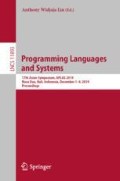Abstract
Recently, a proper bisimulation equivalence relation for random process model has been defined in a model independent approach. Model independence clarifies the difference between nondeterministic and probabilistic actions in concurrency and makes the new equivalence relation to be congruent. In this paper, we focus on the finite state randomized \(\text {CCS} \) model and deepen the previous work in two aspects. First, we show that the equivalence relation can be decided in polynomial time. Second, we give a sound and complete axiomatization system for this model. The algorithm and axiomatization system also have the merit of model independency as they can be easily generalized to the randomized extension of any finite state concurrent model.
Access this chapter
Tax calculation will be finalised at checkout
Purchases are for personal use only
References
Andova, S.: Process algebra with probabilistic choice. In: Katoen, J.-P. (ed.) ARTS 1999. LNCS, vol. 1601, pp. 111–129. Springer, Heidelberg (1999). https://doi.org/10.1007/3-540-48778-6_7
Baeten, J.C.M., Bergstra, J.A., Smolka, S.A.: Axiomatizing probabilistic processes: Acp with generative probabilities. Inf. Comput. 121(2), 234–255 (1995)
Baier, C., Hermanns, H.: Weak bisimulation for fully probabilistic processes. In: Grumberg, O. (ed.) CAV 1997. LNCS, vol. 1254, pp. 119–130. Springer, Heidelberg (1997). https://doi.org/10.1007/3-540-63166-6_14
Bandini, E., Segala, R.: Axiomatizations for probabilistic bisimulation. In: Orejas, F., Spirakis, P.G., van Leeuwen, J. (eds.) ICALP 2001. LNCS, vol. 2076, pp. 370–381. Springer, Heidelberg (2001). https://doi.org/10.1007/3-540-48224-5_31
Deng, Y.: Semantics of Probabilistic Processes: An Operational Approach. Springer, Heidelberg (2015). https://doi.org/10.1007/978-3-662-45198-4
Deng, Y., Palamidessi, C.: Axiomatizations for probabilistic finite-state behaviors. In: Sassone, V. (ed.) FoSSaCS 2005. LNCS, vol. 3441, pp. 110–124. Springer, Heidelberg (2005). https://doi.org/10.1007/978-3-540-31982-5_7
Fu, Y.: Checking equality and regularity for normed BPA with silent moves. In: Fomin, F.V., Freivalds, R., Kwiatkowska, M., Peleg, D. (eds.) ICALP 2013, Part II. LNCS, vol. 7966, pp. 238–249. Springer, Heidelberg (2013). https://doi.org/10.1007/978-3-642-39212-2_23
Fu, Y.: A uniform approach to random process model (2019). https://arxiv.org/pdf/1906.09541.pdf
Giacalone, A., Jou, C.C., Smolka, S.A.: Algebraic reasoning for probabilistic concurrent systems. In: Proceedings of IFIP TC2 Working Conference on Programming Concepts and Methods. Citeseer (1990)
Glabbeek, R.J.: A complete axiomatization for branching bisimulation congruence of finite-state behaviours. In: Borzyszkowski, A.M., Sokołowski, S. (eds.) MFCS 1993. LNCS, vol. 711, pp. 473–484. Springer, Heidelberg (1993). https://doi.org/10.1007/3-540-57182-5_39
van Glabbeek, R.J., Smolka, S.A., Steffen, B.: Reactive, generative, and stratified models of probabilistic processes. Inf. Comput. 121(1), 59–80 (1995)
van Glabbeek, R.J., Weijland, W.P.: Branching time and abstraction in bisimulation semantics. J. ACM 43(3), 555–600 (1996)
Hansson, H., Jonsson, B.: A framework for reasoning about time and reliability. In: Proceedings of Real-Time Systems Symposium, pp. 102–111. IEEE (1989)
Hansson, H., Jonsson, B.: A calculus for communicating systems with time and probabilities. In: Proceedings of 11th Real-Time Systems Symposium, pp. 278–287. IEEE (1990)
Herescu, O.M., Palamidessi, C.: Probabilistic asynchronous \(\pi \)-calculus. In: Tiuryn, J. (ed.) FoSSaCS 2000. LNCS, vol. 1784, pp. 146–160. Springer, Heidelberg (2000). https://doi.org/10.1007/3-540-46432-8_10
Huang, M., Yin, Q.: Two lower bounds for BPA. In: 28th International Conference on Concurrency Theory, CONCUR 2017, 5–8 September 2017, Berlin, Germany, pp. 20:1–20:16 (2017). https://doi.org/10.4230/LIPIcs.CONCUR.2017.20
Jou, C.-C., Smolka, S.A.: Equivalences, congruences, and complete axiomatizations for probabilistic processes. In: Baeten, J.C.M., Klop, J.W. (eds.) CONCUR 1990. LNCS, vol. 458, pp. 367–383. Springer, Heidelberg (1990). https://doi.org/10.1007/BFb0039071
Kučera, A., Jančar, P.: Equivalence-checking on infinite-state systems: techniques and results. Theory Pract. Logic Programm. 6(3), 227–264 (2006)
Larsen, K.G., Skou, A.: Bisimulation through probabilistic testing. Inf. Comput. 94(1), 1–28 (1991)
Lowe, G.: Probabilities and priorities in timed CSP (1993)
Milner, R.: Communication and Concurrency, vol. 84. Prentice hall, New York (1989)
Milner, R.: A complete axiomatisation for observational congruence of finite-state behaviours. Inf. Comput. 81(2), 227–247 (1989)
Philippou, A., Lee, I., Sokolsky, O.: Weak bisimulation for probabilistic systems. In: Palamidessi, C. (ed.) CONCUR 2000. LNCS, vol. 1877, pp. 334–349. Springer, Heidelberg (2000). https://doi.org/10.1007/3-540-44618-4_25
Stark, E.W., Smolka, S.A.: A complete axiom system for finite-state probabilistic processes. In: Proof, Language, and Interaction, pp. 571–596 (2000)
Acknowledgement
We are grateful to Prof. Yuxi Fu for his instructive discussions and feedbacks. We thank Dr. Mingzhang Huang, Dr. Qiang Yin and other members of BASICS for offering helps in the revision stage. We also thank the anonymous referees for their questions and detailed comments. The support from the National Science Foundation of China (61772336, 61872142, 61572318) is acknowledged.
Author information
Authors and Affiliations
Corresponding authors
Editor information
Editors and Affiliations
Rights and permissions
Copyright information
© 2019 Springer Nature Switzerland AG
About this paper
Cite this paper
Zhang, W., Long, H., Xu, X. (2019). Uniform Random Process Model Revisited. In: Lin, A. (eds) Programming Languages and Systems. APLAS 2019. Lecture Notes in Computer Science(), vol 11893. Springer, Cham. https://doi.org/10.1007/978-3-030-34175-6_20
Download citation
DOI: https://doi.org/10.1007/978-3-030-34175-6_20
Published:
Publisher Name: Springer, Cham
Print ISBN: 978-3-030-34174-9
Online ISBN: 978-3-030-34175-6
eBook Packages: Computer ScienceComputer Science (R0)

